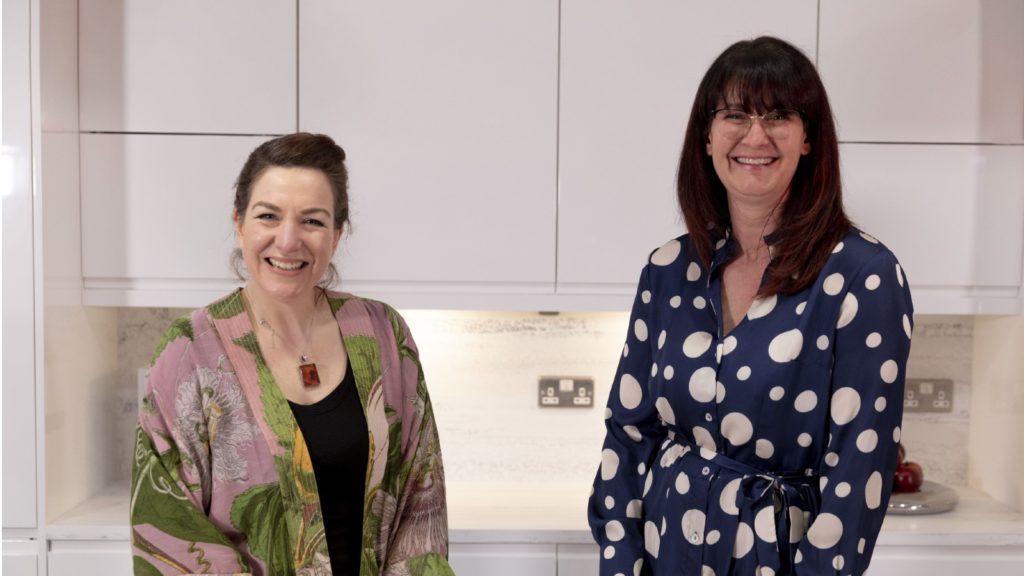Entertaining, working from home, and even exercising are among the most popular activities Brits carry out in the kitchen, according to research revealing how multi-functional the space needs to be.

Architect and designer Laura Jane Clark from BBC’s Your Home Made Perfect has partnered with Häfele on the research, with head of marketing Natalie Davenport
An estimated 4.55 million homeowners (26%) use their kitchens for socialising and entertaining, 2.8 million (16%) use the room to relax in, and 1.9 million people (11%) use it as a playroom or homework area for children.
The data also shows 1.75 million homeowners (10%) use the kitchen as a makeshift office when working from home and 700,000 homeowners (4%) even exercise in their kitchens.
Sponsored Video
The findings from Häfele UK, which questioned 2,009 homeowners across the UK, found the need for flexibility was an important factor for homeowners when choosing a new kitchen, with 15% saying they wanted to be able to change the function of the room, for example by closing off areas to hide mess or change the use of the space.
On top of this, 13% said they wanted to be able to change the mood of their kitchen, for example using lighting to create different atmospheres when cooking, working, entertaining or relaxing.
The findings are part of Häfele’s new Functional Spaces: Kitchens for Living campaign, which explores how consumers use their kitchens, their biggest pain points, and what features, fittings and fixtures would improve their space and enhance their quality of life.
This in-depth study has been undertaken to provide manufacturers, designers, retailers and installers with insights to help them support their customers by creating functional kitchens that maximise the usability, flexibility and value of the space.
Commenting on the initial findings, architect and designer Laura Jane Clark from BBC’s Your Home Made Perfect, who has partnered with Häfele on the research, said: “Traditionally kitchens have been smaller spaces added onto a home with the main purpose of cooking, but that way of thinking isn’t fit for modern living.
“Not only do we have more appliances, technology and features we want to squeeze into the space, but the way we live and interact in our homes continues to evolve.
“As Häfele’s research shows, we need our kitchens to be flexible enough for multiple purposes and suitable for everyone in the household.
“As part of this, we need to think about how to create physical and visual connections in the space, as well as carving out specific areas for designated purposes.
“Broken-plan design can be an effective way to achieve this, but there are lots of design and installation tricks to maximise the usability of the kitchen, depending on the needs of the household.
“For example, you can use sliding doors to create a hidden home office that you can shut away at the end of the day or use drawer fridges and freezers to avoid taking up valuable floor space with large appliances.”
The research revealed one in five people don’t like their current kitchen and 86% said the room impacts their emotional wellbeing and mental health.
Among the negative connotations, people said they felt dissatisfied, sad, stressed, depressed and anxious.
Head of marketing at Häfele UK Natalie Davenport added: “Many of us have spent more time than usual at home over the last two years and it’s highlighted just how important the functionality and flexibility of each room is.
“ Get it wrong and not only does the space not work effectively for us, but it can negatively impact our day-to-day lives and relationships.
“Nearly a third (31%) of the people we questioned said they need to upgrade their kitchen but are worried about getting the design wrong.
“With the kitchen needing to serve so many different purposes, it’s understandable that it can feel a daunting project for some.
“That’s why we’ve commissioned this research and partnered with designer and architect Laura Jane Clark so we can get a true understanding of how the industry can support its customers in getting the right design that balances function with budget and style.”
More findings from the Functional Spaces: Kitchens for Living research will be revealed at kbb Birmingham in March 2022.
Laura Jane Clark will be joining Häfele UK to deliver two masterclasses exploring some of the top findings and offering design and installation advice on Monday 7 March on the Häfele stand (S70).



